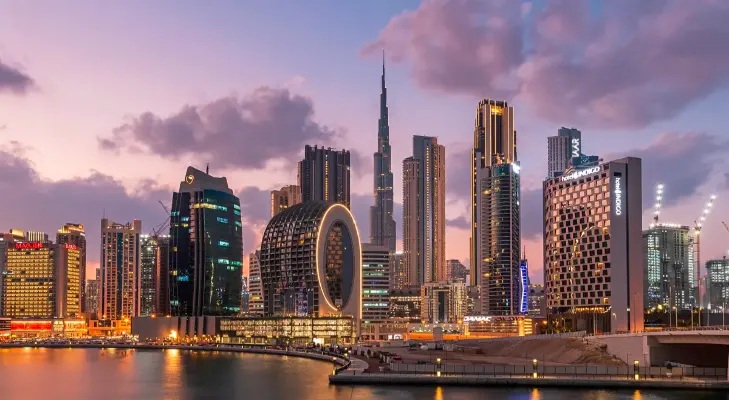Can American Residents Invest in Real Estate in Dubai? A Guide for American Investors
- Oct 23,2024

Dubai has long been a magnet for global investors due to its strategic location, world-class infrastructure, and dynamic economy. Among these international buyers, Americans have increasingly shown interest in tapping into the lucrative real estate market. With its tax-free environment, booming tourism sector, and strong returns on property investments, Dubai presents an attractive opportunity. However, there are specific guidelines and factors that American residents need to consider before diving into the market.
In this guide, we'll walk through everything American investors need to know about investing in Dubai real estate.
Legal Framework for Foreign Ownership
One of the most attractive aspects of Dubai’s real estate market is that it allows foreign nationals, including American residents, to own property. However, foreign investors are restricted to certain areas known as "freehold zones." These zones, designated by the Dubai government, are where non-GCC (Gulf Cooperation Council) nationals can buy, sell, or lease properties without limitations.
Some of the most popular freehold areas for foreign investors include
- Dubai Marina
- Downtown Dubai
- Palm Jumeirah
- Business Bay
- Jumeirah Lakes Towers (JLT)
Each area offers unique advantages, ranging from luxury living to high rental yields, making it essential to align your property investment goals with the right location.
Understanding the Property Types
When investing in Dubai, you’ll encounter a variety of property types, each with its own set of pros and cons:
- Apartments:These are the most common type of property for foreign investors. High-rise buildings in areas like Dubai Marina and Downtown offer excellent rental yields and are usually fully furnished or semi-furnished.
- Villas: If you're looking for a luxury home or a longer-term investment, villas in communities such as Emirates Hills or Arabian Ranches offer privacy and spacious living. However, villas often come with higher maintenance costs.
- Commercial Property: For those looking to expand their portfolios, investing in office spaces or retail properties can be lucrative, especially in business-centric areas like DIFC and Business Bay.
Financing Options for American Investors
Unlike some other international markets, Dubai offers a variety of financing options for foreign nationals, including Americans. While you can pay for your property in cash, mortgages are also available from several UAE-based and international banks.
Some key points to consider
- Loan-to-Value Ratios (LTV):* Foreign investors can typically borrow up to 75% of the property's value
- Interest Rates:* Mortgage rates in Dubai vary depending on the bank, the type of property, and the loan tenure. As of 2024, interest rates for non-residents typically range between 3.5% and 4.5%.
- Documentation:* American residents will need to provide documents such as proof of income, tax returns, and bank statements. Some banks may require a minimum annual income or a substantial down payment.
Tax Benefits
One of the important advantages of investing in Dubai real estate is its tax-free surroundings. The UAE does not levy capital gains tax or property tax on real estate, making it a more appealing destination for investors compared to other international markets. For American investors, however, it's essential to understand that they are still subject to U.S. tax laws.
FATCA (Foreign Account Tax Compliance Act):* Under FATCA, U.S. citizens and residents must report any foreign financial assets, including properties, on their tax returns. Consulting a tax advisor is crucial to ensure compliance with U.S. laws while maximizing the tax benefits of owning property in Dubai.
Rental Yields and Return on Investment
Dubai has one of the best rental yields in the world. In popular areas like Dubai Marina, investors can expect yields of around 5-7%, while more affordable areas like Jumeirah Village Circle (JVC) can offer yields as high as 8-9%.
Several factors influence rental returns, including
- Location:* Prime areas such as Downtown or Palm Jumeirah tend to have lower yields but offer higher capital appreciation
- Property Management:* Many international investors choose to hire property management companies to handle leasing, maintenance, and tenant relationships. While this involves additional costs, it’s a great option for those not residing in Dubai.
Visa and Residency Options
Investing in property in Dubai can also open doors to residency. American investors who purchase property worth AED 750,000 (approximately USD 204,000) or more are eligible to apply for a renewable 2-year investor visa. Additionally, for properties valued at AED 2 million (USD 544,000) or above, you can apply for a 10-year Golden Visa, offering long-term residency in the UAE.
Legal Requirements and Procedures
The procedure of buying property in Dubai is relatively genuine. Once you've chosen a property, you’ll need to sign a Memorandum of Understanding (MoU) with the seller, which outlines the terms and conditions of the sale. A deposit, typically 10%, is required at this stage.
Afterward, the property must be registered with the Dubai Land Department (DLD). The buyer will need to pay the following fees:
- Transfer Fee:* 4% of the purchase price, paid to the DLD.
- Agency Fees:* Typically around 2% of the property value, paid to the real estate agent handling the transaction.
It is advisable to hire a property lawyer to guide you through the legal process, though it’s not mandatory.
Risks and Challenges
While Dubai offers attractive investment opportunities, there are risks involved. Property prices can be volatile due to market fluctuations, oversupply, or changes in government regulations. As with any international investment, staying updated on market trends and working with trusted professionals is key to mitigating these risks.
A Lucrative Opportunity for American Investors For American residents, Dubai’s real estate market presents a rare blend of high rental yields, tax advantages, and the potential for long-term growth. By carefully navigating the legal and financial landscape, investors can take advantage of Dubai's booming market and diversify their portfolios. However, due diligence and consulting professionals—whether real estate agents, lawyers, or tax advisors—is essential for a successful investment journey in this cosmopolitan city.
Investing in Dubai real estate as an American resident is not just a possibility but a highly lucrative opportunity with the right approach.







